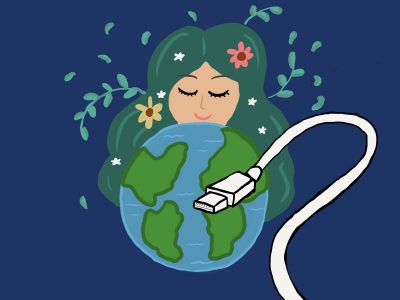The Lorax may have had a point when he said, “Unless someone like you cares a whole lot, nothing is going to get better.” Change can only come from those willing to accept that there is a problem to begin with. This is a sentiment that appears to be a little lost on society — and if we don’t fix it soon, we risk losing the very essence of what makes us human.

Globalization has undeniably given humanity some of its most coveted inventions like the light bulb, the telephone and microwavable mac-and-cheese! But what is often overlooked is its consequences.
There’s no denying that society’s industrialisation has robbed us of something truly human.
Every day, our minds are inundated with horrifying tragedies, national crises and economic burdens. Researchers urge us to “tune out” or step away from the screen because the display is simply too damaging to handle — but that seems like an impractical task in a world where everyone has a cellphone or computer. These travel-size bits of hardware are essential components of the working world, and integral for keeping us all in touch with one another.
Evolving from packs of 10-100 people, humans are not biologically built to withstand the demands of connectivity with the billions of people in the world and on our news feeds.
What can we say? We are a screen-dependent, technology-driven shell of a society we once were.
It’s hard to fathom, but the hunter-gatherer era was one of the last times where we as a collective were one with mother nature. It was a beautiful time certainly — there was no worrying about how much money was in your savings, texting your situationship back or completing the endless tirade of assignments.
There was silence. There was peace. Just man, nature and possibly a furry companion along for the ride.
Okay, maybe life wasn’t as simple as that, but we often find ourselves detached from the world around us. Why is that?
The psychological imprint left by the industrial revolution is unmistakable. Studies have shown a dramatic increase in neuroticism, anxiety disorders, depression and substance abuse. The most tangible consequences of modernity have manifested themselves through us.
Even in terms of independence humans have begun to falter. The concept of “living off the land” now seems foreign in society today, partly because there’s no need to, but also due to the fact that no one knows how.
If the world were to plunge into some catastrophic, unforeseen apocalypse tomorrow, very few of us would be equipped with the necessary skills to survive.
How do you start a fire in an emergency? Build a shelter in a pinch? Gather food in the absence of a nearby grocery store? They’re skills privy to your average Boy Scout today, but sparse among the general population.
Perhaps knowing how to do these things with all the technology nowadays is a little outlandish — but these aren’t the only skills we’ve lost.
In relying on today’s advancements, humans have forgone many basic communication, social and connection skills that have long been essential to our very existence as familial creatures.
For as much as we appreciate the conveniences gifted to us by modern technology, in reflecting deeper on our evolution from an agrarian lifestyle to a more urban one, we cannot help but feel a deep sense of loss.
It’s fair to mourn the simplicities of our past lives, especially because of how easy it is to get lost in the commotion of the world today. The future is a looming threat constantly hanging over our heads, and we are continually fearful of what we must do, and what is to come.
In the midst of it all, many of us would love nothing more than to just float away from all our troubles into a small cabin out in the middle of nowhere. No internet, no assignments, no bills — just us and the Earth.
So the long overdue question of our time is: how do we reconnect with Earth? Where do we make space to fulfill our fantasy of running through fields of fresh flowers, gathering berries in the forest and exploring every natural wonder there is?
We’re not saying we should totally abandon the world today for anarcho primitivism (though that may certainly yield some pretty interesting results,) but by taking a step back and exploring what lies beyond the four corners of Boston University we can rekindle this connection.
In adhering to the wisdom of Mr. Lorax — if we acknowledge the issue, we are on the steadfast path to cultivating change. Yes, we have lost a bit of ourselves, but in returning our roots by ditching the tech every now and then, perhaps we can make things whole once again.
This editorial was written by Opinion Editor Analise Bruno
















































































































